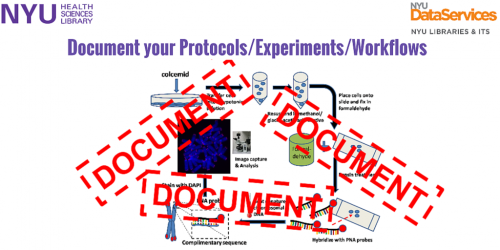We know as researchers that we want to be able to understand the contents of our scholarly materials, and we understand on some level that this requires documenting files and indexing locations. But why, despite best intentions, does documenting turn out to be so difficult to accomplish? Why do the best intentions in keeping a project organized often inevitably result in a scramble to keep everything sorted into the right bin?
 Undoubtedly, the answer is largely related to time, a scarce commodity in the current pressured production environment for research. And one cannot avoid the fact that it does take a certain amount of time and effort to get a documentation system off the ground. The good news, however, is that documentation systems often demand close attention and resources early in the process, but once a workable system is in place it can be replicated across projects in a way that makes the effort less burdensome down the road. And good research management is often about increasing efficiency. Use automated computing processes whenever possible to reduce the time in manipulating research files. Deploy central dashboards that bring together the various threads of your work. And if you work on multiple devices in multiple locations (as we often do), get your cross-device working environment in order so that you don’t have to constantly reformat work done on one device so that it conforms with the official documentation scheme you have deployed on another.
Undoubtedly, the answer is largely related to time, a scarce commodity in the current pressured production environment for research. And one cannot avoid the fact that it does take a certain amount of time and effort to get a documentation system off the ground. The good news, however, is that documentation systems often demand close attention and resources early in the process, but once a workable system is in place it can be replicated across projects in a way that makes the effort less burdensome down the road. And good research management is often about increasing efficiency. Use automated computing processes whenever possible to reduce the time in manipulating research files. Deploy central dashboards that bring together the various threads of your work. And if you work on multiple devices in multiple locations (as we often do), get your cross-device working environment in order so that you don’t have to constantly reformat work done on one device so that it conforms with the official documentation scheme you have deployed on another.
Some common practices deployed in documenting data include:
- Use of readme files to explain the contents of folders and directories. Take a look at this helpful guide from Cornell University’s Research Data Management Service Group for ideas.
- Reliance on a project management dashboard, e-Lab Notebook, or cloud-based file manager to gather everything together. We list several on our Documenting Data guide.
- Matching of long-term documentation systems to ongoing research analysis needs as far as possible. In other words, use the same strategies for documenting your research materials in the long run that you will also use to push your analysis forward and enable publication.
Happy documenting, and keep up with Wednesday’s Love Your Data week focus on documenting data on Twitter, #LYD16!
